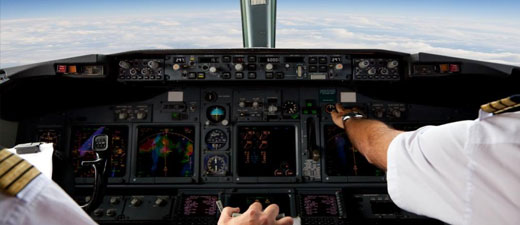
About one in 10 pilots shows signs of depression. Why is it that of all professions pilots seem so vulnerable?
The research team around work safety and environmental health professor Joseph Allen from the Harvard School of Public Health asked 3,500 pilots anonymously about their workplace. Only about half of the participants answered a set of questions about their psychological conditions.
In their analysis, the medical experts found that 12.6 percent of the participants showed signs of depression. On average, the rate is between 4 and 7 percent. So pilots would appear to be more at risk. Some 4 percent even said they had had suicidal thoughts within the last two weeks.
Those affected by such thoughts included pilots, who had a history of having experienced either sexual or verbal harassment. But the pilots do not generally talk about psychological issues, the study found.
Allen is quoted by the German news agency DPA as saying there is a “veil of secrecy” around the issue of psychological problems in the cockpit.
The study was published on Thursday (15.12.2016) in the journal “Environmental Health.” It is likely to be read with some interest in Germany, following the March 2015 crash of a Germanwings airliner. On that flight, a suicidal co-pilot deliberately steered the plane into a mountain in France.
Irresolvable stress can lead to depression
The results of the study surprise Markus Wahl – a pilot and spokesman for the German pilots’ trade union, Vereinigung Cockpit. Wahl declined to comment directly on the numbers in the study. But he explains why pilots may be more inclined to suffer from depression than people in other professions.
“Pilots may be more exposed because they work in a high-risk environment. Their decisions can endanger human lives,” said Wahl.
And the pressure is growing in their workplace. “They have to make more and more decisions,” says Wahl. “The workplace is becoming more stressful, and stress can lead to psychological illness.”
Incompatible: job and family
One key factor triggering stress in pilots is extended periods away from home.
“There are times when pilots spend 20 to 22 days in hotel rooms. This is a big burden on friends, family and their partners,” says Wahl, who is also a pilot. “All those personal relationships are very important for coping with stress. But they’re not there, as it is the case in a normal 9-to-5 job.”
And when they are at work, they may worry about problems at home for days on end. Say there’s trouble in the family, like an argument just before the pilot departs for their next flight, they could carry that worry for several days. They may not even be able to resolve the family conflict with a telephone call, because of different time zones. And if the conflict remains unresolved, it may make them sick.
In addition, at peak travel-times like during the summer holidays, times for recreation get shorter and shorter. As a result, there is no time left so discuss issues with the family.
Do I get my job done?
Pilots have less time today than they did just a few decades ago. The turnaround time at many airports has shrunk from 60 to 35 minutes – that’s the time from landing to taking off again. Even a minor problem under those circumstances can cause a lot of stress.
Wahl describes a typical situation: “We used to have ground technicians, who took care of minor problems after landing. Today, in many places, ground technicians are no longer employed. So the pilot has to solve the problem.”
During the short time that is left, they will also have to call the office. Minor defects, for instance, do not always have to be repaired on the spot. They can be fixed later. “But you have to make the phone call and write everything into a technical log-book, and document everything. There are lots of legal regulations, and paper work – all this for just a broken light bulb.”
Recognition in the team
Knowing that you are doing a good job is important for coping with stress. This is something that works well among colleagues, the pilot says.
“The pilots feel a sense of success from doing a good job – from flying a plane safely from A to B. But they want recognition from within the close circle of professionals – when a colleague says, ‘This flight you did particularly well.'”
Unfortunately, such recognition is not often expressed in today’s management culture, says the trade unionist, Wahl. “Perhaps at Christmas, there will be a written letter saying: ‘Yes, we are doing great!’ But it’s rare that someone from fleet management comes over – someone who is a direct supervisor – and says: ‘Boys, this is great, you’re always on time and our customers like it!’ I haven’t heard this in a long time.”
Fabian Schmidt – DW

